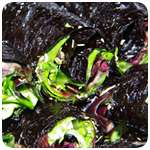
This awesome recipe has been updated.
It's new awesome, updated self is over at Raederle.com!
Click here and you can check it out.
“There is only one major disease and that is malnutrition. All ailments and afflictions to which we may fall heir are directly traceable to this major disease.” ~ D.W. Cavanaugh, M.D., Cornell University
Rig: Somehow I don't think Huntington's disease is traceable to malnutrition, nor is Tay-Sachs. I also don't think getting the flu or a cold or any kind of viral or bacterial infection can be prevented by diet, although certainly someone with a healthy diet is better equipped to deal with infections than others.Regardless, I would definitely not say that the quote is true. Its just my opinion, but someone who believes they have found the end-all source of "all ailments and afflictions" (without that source being tautologically true), is either naive or arrogant; most likely, if they are educated, they are trying to get grant money, in which case saying things like that are meant to convince the naive and arrogant government and administrators that they deserve funding.Sorry, but I think its stupid to believe in a panacea, and intelligent to eat healthy.
Ling: Flus and colds can be prevented by dietary choices. Because once infected a virus is always in the blood, viral infections in particular can be prevented and lessened in severity by food choices. This is not info from a book, its a record of my own life experience, so it may not be true for all but I have proven it to myself.If you eat nutrient dense foods your body will reward you with long lasting good health. I would say that malnutrition, particularly of certain minerals, very likely plays a role in all ailments and afflictions.
Raederle: I am taking Empty Harvest with a grain of salt, Gallow. As I said in my first comment, I know not everything in it is true. For example, it certainly does not take two acres of land to feed one person. It takes an incredibly tiny piece of land, especially with today's technological conveniences. I have a blog entry which goes into detail about how much space it actually takes to feed a person or a family. Two football fields for one person? -(Which is what the book implies.)- Absurd.It does contain other interesting information about top soil and nutrients and how they interplay in the body. I don't think I've ever read a single book that I couldn't spot a bit of mis-information, and for every piece I can spot, there are probably ten other things I accept as true when they are only partly true, or not really true at all. This is the nature of all information.There are levels within levels. While the quote isn't 100% true, I think offers the concept that malnutrition costs the vast majority of disease.As Iron pointed out, there are other factors. As Russ mentioned, animals can still get disease in the wild, although that doesn't disprove anything since they could be suffering from malnutrition even in a "natural" setting. As Gallow suggested, everything with a grain of salt.And perhaps most importantly, as Ling mentioned, common diseases are easily combated with diet. I went from having strep throat one to four times a year to not having it at all after I first made dietary changes at the age of 17. It wasn't a coincidence.
Tina: You know, when I first read the quote, I thought it could be about malnutrition of the spirit/soul...
I agree with Raederle about taking the quote with a grain of salt. She just put up a quote with good intentions; she didn't say everyone has to live by it.
Russ: I think it's important to make a distinction between acute and chronic diseases. Since embracing a mostly raw vegan lifestyle, I too no longer get sick. I don't get colds anymore, I don't get the flu, I don't get strep throat. My immune system is functioning on all cylinders.A bit of anecdotal evidence: My wife, my sister and I ate some undercooked fiddlehead ferns this spring. Little did we know, undercooked fiddleheads contain bacteria that can make people sick and cause food poisoning. Tracy had absolutely no ill effects. I only had very mild intestinal trouble. My sister was up all night sick as can be.Was it the difference in diet and lifestyle between Tracy and I and my sister? Or was it something else? I think there is something to be said for a healthy diet and lifestyle and it's impact on helping people resist acute illness. It's also pretty established that the chances of getting chronic diseases like diabetes, heart disease and certain cancers are dramatically increased when poor diet and lifestyle choices are present.However, I'm a little skeptical that Americans are as severely undernourished as some raw gurus and vitamin/mineral/superfood pushers would have you believe. I think it's more about the type of food people are eating -- mainly food that we have not evolved or adapted to eat in conjunction with genetic variances, modern lifestyle and to some extent, nutritional imbalance.
Food processorJuicerDehydratorBlender



